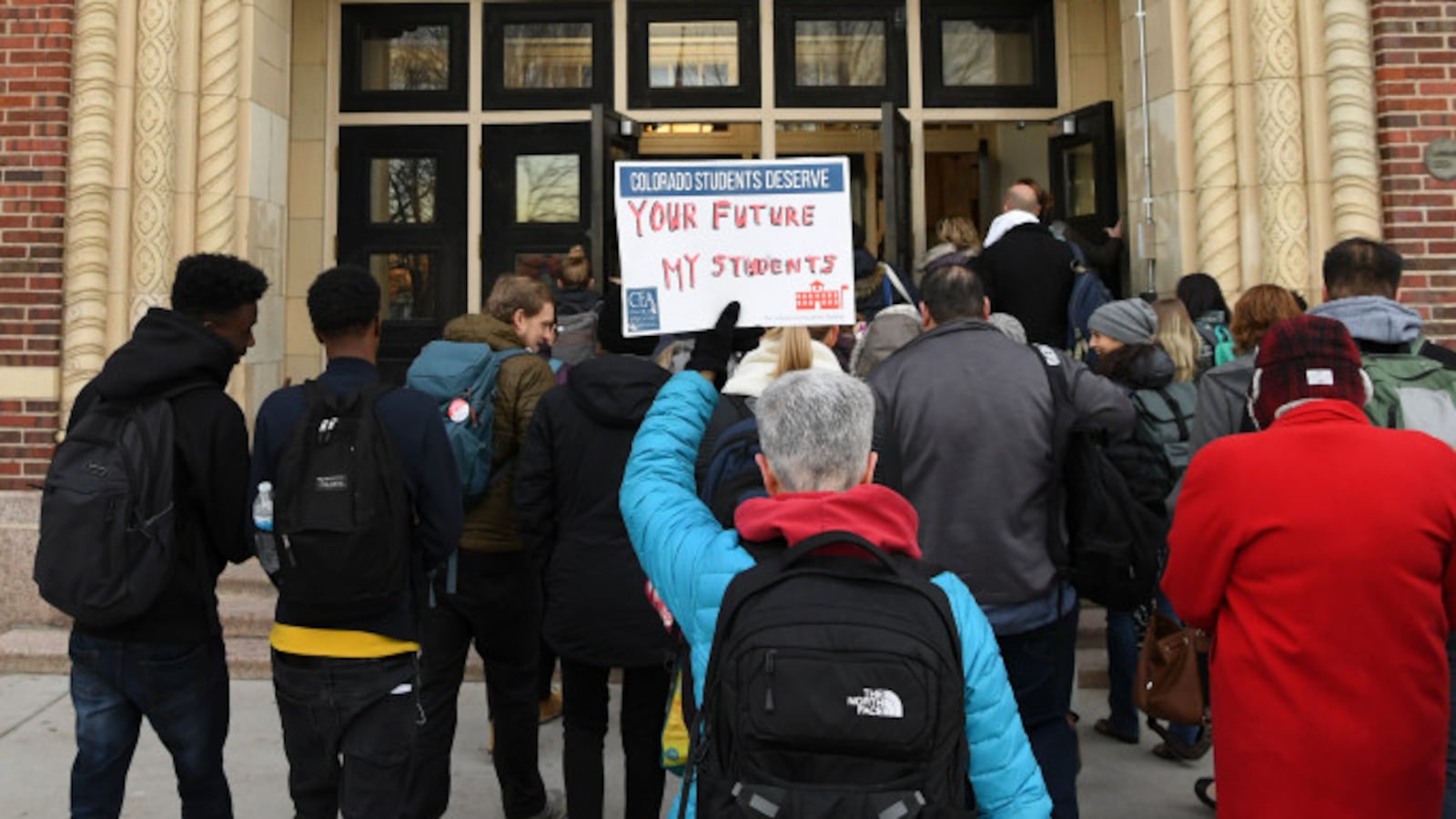The Denver district and teachers union will head back to the bargaining table Thursday at 5 p.m. as they continue to await word on whether Gov. Jared Polis will intervene in their pay dispute.
The Denver Classroom Teachers Association offered the date, which is notable because union officials previously had cast doubts on the value of ongoing negotiations unless the district is willing to come up with more money for teacher pay.
Union Executive Director Pam Shamburg said the union had no confirmation from the district that it would offer more money, but that officials had said “everything is on the table.”
“We are willing to come to the table in a good faith effort to get a deal done,” Shamburg said.
The two sides have been in a bit of a holding pattern. After the teachers union voted to go on strike, the district requested state intervention in the hopes that a mediator or fact-finder could help broker a deal. The union opposes intervention and is preparing its members to walk off the job to pressure the district to meet its demands.
Teachers cannot legally strike while a decision about state intervention is pending.
Polis has encouraged the district and the union to continue negotiating while state officials decide whether to intervene. Denver Public Schools Superintendent Susana Cordova said last week that the district was eager to return to the table, but no date had been set at that time.
Tuesday’s date setting comes on the same day as a conference call between representatives of the governor’s office, the state labor department, the district, and the state teachers union.
Shamburg characterized Tuesday’s conference call as an opportunity to get feedback from the governor after his Office of State Planning and Budgeting did its own analysis of the two sides’ competing proposals, which differ in philosophy and cost. Colorado Education Association President Amie Baca-Oehlert and a researcher with the state teachers union were on the call on behalf of the union. District spokesperson Anna Alejo added that Polis set up the call to make sure there was clarity on the cost of the two sides’ proposals.
Throughout the negotiations, it has often seemed as if the district and the union are not operating from the same set of facts, such as how much each proposal will cost over the long-run, how many teachers would take advantage of opportunities for raises, or how different policies affect teacher retention.
In its filing on Monday asking the state to stay out, the Denver Classroom Teachers Association said the district had “effectively unraveled” months of negotiations based on shared assumptions by introducing “a completely different financial model” last Thursday.
Mark Ferrandino, the Denver district’s chief financial officer, said that far from introducing a different financial model, the district was engaged in a good faith effort to come up with more accurate assumptions about where teachers would fall on the proposed salary schedule and the likely cost of that schedule. To do so, it looked at numbers from neighboring Aurora Public Schools, whose salary schedule is similar to the one proposed by the union.
“It’s the same financial model we’ve always been using,” Ferrandino said — just updated.
Shamburg, meanwhile, does not believe the new information makes the model more accurate because it’s not based on Denver teachers.
This kind of disagreement is emblematic of the lack of trust between the two sides and of the competing claims that state officials are weighing as they decide whether to intervene.
The state cannot impose an agreement on the district and the union, but it can require the two sides to participate in mediation, conduct independent fact-finding, or hold public hearings in an effort to broker a deal.
Cher Haavind, a spokeswoman for the Colorado Department of Labor and Employment, which is the agency that would intervene, said the purpose of the joint call Tuesday afternoon was to share information and better understand each side’s position.
Haavind said one reason the law allows 14 days for the department to make a decision about whether to intervene is to provide an opportunity for the informal convening and information gathering “that helps us explore the value of intervening or not intervening.”
Rumors have swirled that a decision by the department is imminent. Haavind said she does not expect the governor’s office and state labor officials to take the full two weeks to decide, but she stressed Tuesday that no decision has been made and that officials are actively weighing evidence and seeing what happens over the next few days.
“You have to be respectful of the process and the collective bargaining agreement and the working conditions,” she said. “We want to intervene if it’s helpful and we do not want to intervene if it will get in the way of negotiations.”
She called the return to the bargaining table “positive.”
Denver Public Schools and the Denver Classroom Teachers Association are negotiating an agreement that governs a system of bonuses and incentives that teachers receive on top of their base pay. The system is known as ProComp. As part of these negotiations, the union pushed the district to put an additional $30 million into teacher compensation. The district has offered more than $20 million, but the two sides are still roughly $8.5 million apart.
They also have strong philosophical differences about how teacher compensation should be structured, with the district wanting to keep more money for bonuses and the union wanting smaller bonuses and larger base pay.

